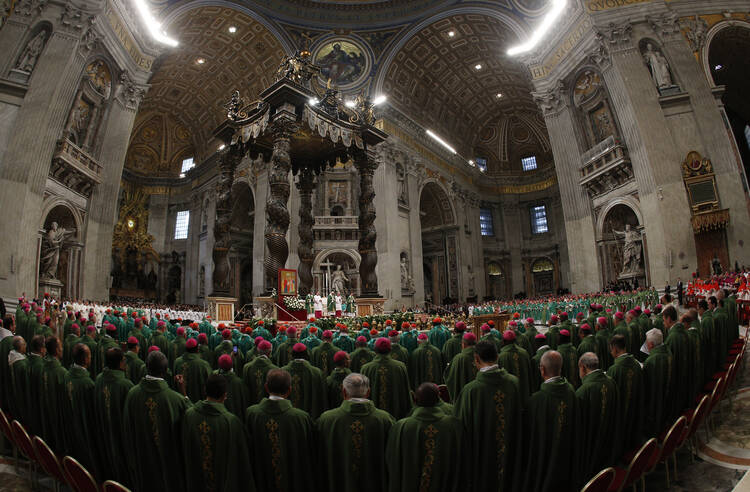“A Church with closed doors betrays herself and her mission, and, instead of being a bridge, becomes a roadblock,” Pope Francis stated in his homily as he opened the synod of bishops on the family, during concelebrated Mass in St Peter’s Basilica on October 4.
Francis is a pope who starts from the real, lived experience of people, not from ideas, and this was reflected clearly in today’s homily. Addressing the 270 synod fathers from all continents and the 48 other participants (including 18 married couples) at this important assembly, he began by presenting a radiograph of the contemporary world around three themes drawn from the scripture readings at the mass: solitude, love between man and woman, and the family.
He analyzed the real and often dramatic situation of people in today’s globalized world, marked by “a growing loneliness and vulnerability,” the image of which is “the family.”
Then speaking of marriage and the family, he explained, among other things, that “for God, marriage is not some adolescent utopia, but a dream without which his creatures will be doomed to solitude” and said that “being afraid to accept this plan paralyzes the human heart.”
He noted that “paradoxically, people today—who often ridicule this plan—continue to be attracted and fascinated by every authentic love, by every steadfast love, by every fruitful love, by every faithful and enduring love.” And he emphasized that “the goal of conjugal love is not simply to live together for life, but to love one another for life.”
In the face of what he described as an “extremely difficult social and marital context” in the contemporary world, Pope Francis said the church “is called to carry out her mission in fidelity, truth and love.” He went onto spell out what approach this mission calls for, and he clearly hopes that this approach will be reflected in the synod’s conclusions.
First of all, he said, the church must carry out her mission “in fidelity to her Master as a voice crying out in the desert.” This means “defending faithful love and encouraging the many families which live married life as an experience which reveals of God’s love.” It also entails “defending the sacredness of life, of every life” and “defending the unity and indissolubility of the conjugal bond as a sign of God’s grace and of the human person’s ability to love seriously.”
Next, the church must carry out her mission “in truth”, that is “the truth which is not changed by passing fads or popular opinions.” She must present “the truth which protects individuals and humanity as a whole from the temptation of self-centeredness, and from turning fruitful love into sterile selfishness, faithful union into temporary bonds.”
Thirdly, he said the church must carry out her mission “in charity.” This means “not pointing a finger in judgment of others, but—faithful to her nature as a mother—conscious of her duty to seek out and care for hurting couples with the balm of acceptance and mercy.” In this context, the church must be “a ‘field hospital’ with doors wide open to whoever knocks in search of help and support; to reach out to others with true love, to walk with our fellow men and women who suffer, to include them and guide them to the wellspring of salvation.”
Well aware of the pre-synod battles between those who see the orthodox teaching of the church being put at risk by those who are emphasizing the need for mercy in addressing the different pastoral problems related to the family, Pope Francis reminded the synod fathers that “a Church which teaches and defends fundamental values” must not forget the words of Jesus in the Gospel that “the Sabbath was made for man, not man for the Sabbath” (Mk 2:27). She must also remember that Jesus said, “Those who are well have no need of a physician, but those who are sick; I came not to call the righteous, but sinners (Mk 2:17).”
Francis insisted that the church must teach “authentic love, which is capable of taking loneliness away, without neglecting her mission to be a Good Samaritan to wounded humanity.”
In support of his stance, Francis recalled what Saint John Paul II said in 1978: “Error and evil must always be condemned and opposed; but the man who falls or who errs must be understood and loved… we must love our time and help the man of our time.”
He concluded by insisting that “the Church must search out these persons, welcome and accompany them, for a Church with closed doors betrays herself and her mission, and, instead of being a bridge, becomes a roadblock.”








